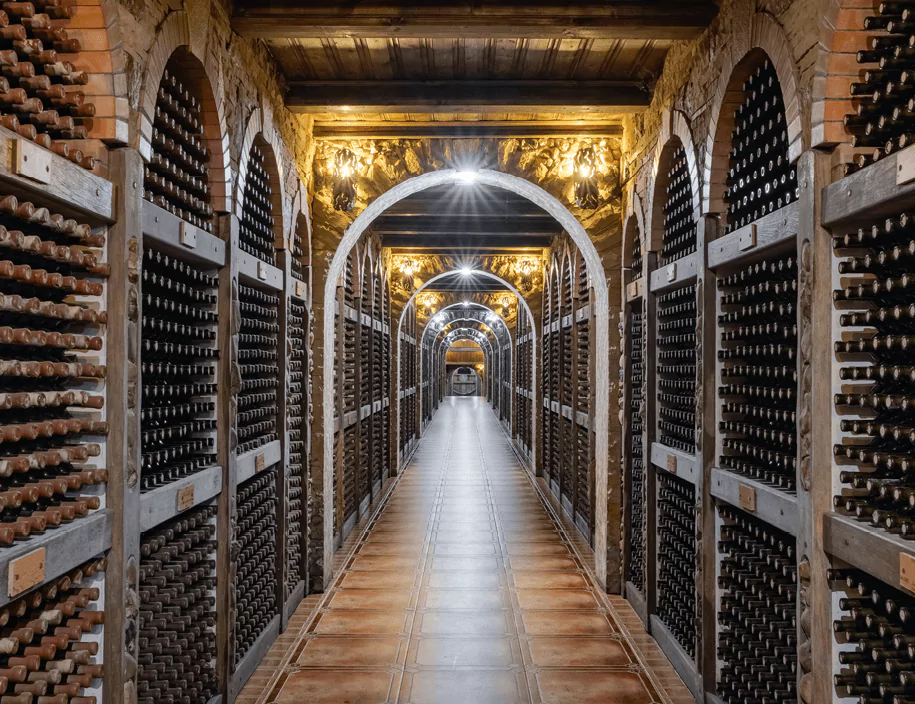How To Start A Wine Collection
If you want to start a wine collection, we're here to help and have come up with five tips so that you're all set and ready to go.

If you want to start a wine collection, we're here to help and have come up with five tips so that you're all set and ready to go.
Collecting wine is a fantastic hobby. Buying special cases or bottles, tucking them away and thinking about when you’ll drink them, it’s an addictive, sometimes intoxicating pastime, whatever your budget.
It can, however, be difficult to know where to start. From knowing which wines to choose to begin your cellar, how to build your collection across different vintages and regions or choosing which merchant to deal with, there are a huge number of variables to consider and many different paths to choose.
Here at Vinum, we have decades of experience in helping clients build their dream portfolios, either from scratch or taking an existing collection to the next level and so have put together a few tips to help to have a better idea of where to start.
This might sound obvious but buying the types of wines that you actually enjoy to drink is just about as good a first step as you’ll find. Having a cellar of wines that you love, at varying degrees of maturity that you can dip into in the coming years is the dream of most aspiring wine collectors.
If you love Bordeaux, make this an integral part of your collection. Likewise, if you explore new areas and regions and develop a passion then add these wines to your growing portfolio.
That said, don’t be afraid to stretch yourself. There are classics out there that are classics for a reason, they’re great wines and age beautifully. You might not be a huge Southern Rhone or Rioja drinker, but a case or two of a top Chateauneud-du-Pape or ace Gran Reserva to dip into every now and again when the occasion arises is always a good idea.
If you’re new to the world of fine wine and want to know more, getting a qualification is a really good idea. Organisations such as the WSET (Wine & Spirits Education Trust) offer the training that many in the wine trade undertake and provide a strong grounding in regions, grape varieties and wine styles, as well as how to objectively appreciate them. Their courses are open to the public and are perfect if you want to take some of the mystery out of the fine wine world and have more confidence in knowing a bit more about what you’re buying.
If you’re building a collection, you’ll want wines with the capacity to age. If your wines don’t have the ability to mature and gain in complexity and nuance, then when you come to drink them in the future, you could be disappointed.
Bordeaux (claret) is the poster child (benchmark?) for ageing capacity. At the ‘fine’ end of the market, the wines are generally available young but are built to age. From a great vintage and chateaux, this ‘age-ability’ can be measured in decades.
But Bordeaux doesn’t have the monopoly on ageing potential. For red wine fans, the Rhone Valley, Burgundy, Barolo, Tuscany and the Napa Valley are all home to wines which mature wonderfully well.
White wines can also age very well, particularly white Burgundy (Chardonnay) and Riesling. Champagne is also a dream addition to any great collection and can be very hard (and expensive) to find when mature.
If you’re buying wines to age then good storage is key. Think of a wine cellar and the usual image that comes to mind is a damp stone vault under a stately home. While this is good if you have one, it isn’t necessary, or necessarily the best option.
The vast majority of collectors in the UK (and many not based in the UK) store in temperature-controlled bonded warehouses. A professionally managed bonded warehouse will store ‘in bond’ so ex UK duty and VAT in perfect conditions.
This has two main benefits. Firstly, it ensures that your wine will mature slowly so that when you come to drink it, it’s as it should be.
Secondly, if you think you might want to sell some of your collection in the future perhaps if you’ve made a profit on it or your tastes have changed, then cases kept in professional bonded storage are the gold standard and therefore tend to sell more quickly than cases kept in private cellars.
If you want to know more about Vinum’s storage offerings please click on these links for options in the United Kingdom and Singapore.
This is probably the most important point on the list. The nature of wine collecting means that there is a huge amount of trust involved. Lead times can be long and if you’re storing the wines professionally, you won’t physically have them in your possession.
The most trustworthy and stable merchants tend to be the wines that have been around for a long time. Look for merchants that have histories measured in decades rather than a few years, that have stable financials and an experienced team looking after you. Like many markets, the fine wine market has its ups and downs and the merchants that have weathered the storms in the past and come out the other side are the wines that are the most likely to be around for decades to come.
These are just a quick few tips that we hope you find helpful if you are looking to start a wine collection. If you’d like to know more about the fine wine world, collecting wine and how us here at Vinum can help then simply get in touch and we’ll be more than happy to have a chat.